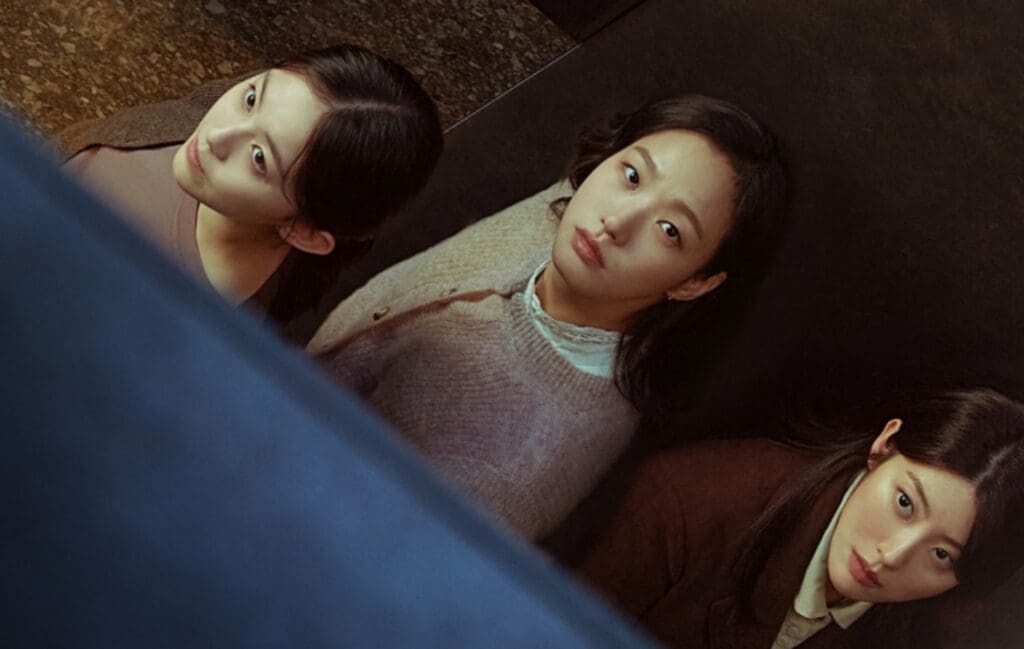Summary
Packed with detail and subtle intensity, Little Women sets the scene for what could be a gripping drama.
This recap of the Netflix K-Drama series Little Women (2022) season 1, episode 1, contains spoilers.
Read: 5 Reasons to Watch Little Women.
We begin by viewing the sights of a modest home, with narration from a character explaining that she always wanted to experience blowing out candles on a cake and having her friends sing to her. From there, we see what appears to be a life rife with underprivileged, the type that leaves our protagonist only able to brush their teeth using salt. “That was when I knew for sure that our lives were different from the lives of people on TV,” one sister says to another, before they both express their happiness in now being able to live “as well as everyone else,” or at least stably enough to buy their younger sibling a cake for her birthday. In-hye, as we then see, is grateful for this turn of events.
Little Women (2022) season 1, episode 1 recap
Next, the three sisters sit down for a meal with their mother (once the owner of the restaurant she works at has gotten out of the way), discussing topics ranging from In-hye’s wish for a nose job to a European field trip the youngest sibling wants to take. As it turns out, In-kyung and In-joo have provided the means for this expedition as a gift, but it only frustrates Hee-yeon, who immediately draws attention to the fact she was never able to visit her daughter’s father in the Philippines because of maxed out credit cards. Mentioning the debts that they have been paying off for four years as a result of their father, In-joo holds firm that her mother should not have been allowed to travel to see the man at partial fault for their woes. Additionally, despite In-hye’s hard work landing her in the best arts school in Korea on a scholarship, she looks to be stripped of the chance to be gifted an opportunity to explore her European dream. Later on, the youngster lingers on her mother’s harsh suggestion that her entry into school was down to her being “charity case.”
After exiting the family home to go on a trip as part of a personal mission to live for herself, Hee-yeon leaves the sisters alone, strapped for cash too thanks to her stealing of In-hye’s birthday money. The trio are naturally all disappointed at what’s unfolded, though In-joo doesn’t forget to ask In-kyung whether they can go halves when it comes to re-earning the money needed for their younger sibling’s Europe trip. However, the arts student doesn’t wish for her sisters to try so hard, seemingly absolving them of responsibility.
At work, the gossiping Ms. Hwang prevents the office outcast In-joo from getting partially paid for her month’s work in advance, with the rather desperate worker labelled self-centred. We see here just how excluded the office employee is, as she watches the rest of her colleagues all hang around together, laughing, joking, and eating. Even her fellow pariah, Hwa-young, provides no help, believing that nothing is more annoying than “fellow outcasts being close.” The self-proclaimed 14th-floor outcast is an expert at flowers, explaining the meaning behind them to In-joo prior to delivering the blunt truth that it’s all about class status when it comes to being part of the in-crowd. “People can only identify with others who are in similar circumstances,” Hwa-young adds, stating that Ms. Hwang would feel disgust towards In-joo.
Once Hwa-young offers to help In-joo out with her need for 1.25 million won, she fields a question on a tattoo above her ankle, which is deemed somewhat suspicious. Nevertheless, the flower expert is able to quickly reassure that the numbers inked onto her body is the date her mother died. Elsewhere, reporter In-kyung draws the ire of her boss when shown to be crying during her delivery of a news story involving the deaths of a family of four. We’re soon made privy to the fact that these tears are a common occurrence, with the middle child of the Oh family deemed “overly empathetic.” That, and In-kyung is informed that she never complains about being treated unfairly (she is oblivious to this), perhaps because of her poorness.
Following on from a quick scene showing that the manipulative great-aunt Hye-suk is now in charge of the three siblings on account of their mother vowing to never return, In-kyung hears from her sister that the older lady is trying to bait her with money (a breakfast meeting that Saturday had been suggested by Hye-suk). Then, the two talk about their ambitions in life, with In-joo outlining her plan to marry a rich man so her siblings can live without debt. In the background, In-hye fixates on her painting.
The next day, In-joo plays the role of someone well-off alongside Hwa-young, happy to share her humble goal of living in the company of her sisters in an apartment with nice windows should she ever become financially well-equipped. The two friends also candidly talk about their unideal living situations here, relating to their shared experiences of working class life as Hwa-young explains that she would want to go somewhere where she can be alone, and remember the things she couldn’t do when poor, should she ever be rich. However, the mood shifts when the topic of office rumours comes up, with the 14th-floor outcast happy to expose the truth behind their colleagues, send her friend the money she needs, and express her idea to get wealthy with her comrade off the back of the accounting software she created. In the bathroom later on, In-joo is told that the shoes she has borrowed from Hwa-young are three-of-a-kind, piquing her curiosity.
As In-kyung asks her great-aunt for the money required to send In-hye on a trip, which succeeds warnings for Hye-suk not to continuously badmouth the sisters’ mother, the request is granted. There is a slight catch, the middle child must visit every weekend to read her relative the paper (it’s made clear that this used to happen in the past too), but the fake proclamation that this task is “receiving consultation from a journalist” covers the need for Hye-suk to ever be paid back with cash. When In-kyung exits, she bumps into a man dropping off a parcel who appears to be an old acquaintance that has returned to Korea.
Maturely, In-hye is disappointed when presented with money from In-joo, understanding that her siblings must have suffered to get it. Refusing to accept the cash, or go on the trip, the arts student doesn’t care that her European adventures would mean a lot to her family, wandering off to enjoy plans with her friends and avoid the awkwardness. Unable to accept what’s happened, In-joo hops in a taxi, presumably ready to follow In-hye.
After watching back a report on elite attorney Park Jae-sang’s apology to Park Seung-ok, a man framed in a 1987 espionage case, the journalists discuss the one-percenters aspirations of becoming the Mayor of Seoul, which includes him smartly forfeiting his bigwig father’s ideologies. In-kyung questions the sincerity of the man because of his shady alignment with Bobae Savings Bank, wanting to pry further into his role in a trial involving the company a while back. Fortunately for the budding reporter, this is something allowed to be followed up on.
When In-hye is given money by a woman, In-joo breaks her cover, rushing over to see what’s happening. There, she is told by Won Sang-a that this was for cab fare because the arts student painted with her daughter, Hyo-rin, though things turn tense when it’s revealed that the youngest of the sisters had cracked on that she had no mother. “If I were you, I would’ve been scared since In-hye is so talented,” the rich mother says, prompting the poor siblings to soon make their slightly hurried exit.
In the taxi, In-joo confronts In-hye over her behaviour in accepting payment, hearing back that the arts student was happy to be making money on her own. A lesson is then taught to the youngster, that they are not beggars, and that some will always give their family things because they look poor, so if this is accepted, it’ll only make them look like the people they try not to be. Meanwhile, In-kyung digs for information on the Bobae Savings Bank trial, spotting that the president of the company had committed suicide. Wondering who would buy someone’s death with money, the journalist gets to work on finding out more.
As Hwa-young departs Korea, she sends over the juicy information gathered on her colleagues to In-joo in the hopes it may come in handy if needed. That day, the oldest of the Oh family is in strong spirits, relieved by what she has been given and optimistic enough to practice changing her posture. However, she is interrupted in due time by Choi Do-il, a man that has worked with Hwa-young before, and now seems to want to align himself with the office loner. A short while after the two new potential allies have made their introductions, Do-il is spotted chatting to Park Jae-sang.
At work, In-kyung talks to her boss about an email she once received from a nephew of Kim Dal-su, the deceased president of Bobae Savings Bank. Allegedly, the man who committed suicide cried, saying that he did not want to die, when on medical parole, but was found dead with a needle in his arm following a meeting with his attorney, Park Jae-sang. It was enough to spark an investigation from the developing journalist, though she admits that the elite man of the law was “as clean as a whistle.” Yet there is one thing that now bugs In-kyung. Four out of the 32 arrested during the Bobae Savings Bank case committed suicide, with all of those people represented by Jae-sang. Dismissing the correlation due to a lack of proof, Wan-gyu is initially unconvinced, until a neat diagram shows how 400 billion won disappeared (140 billion won’s worth went to Jae-sang, and the suicides removed all traces), heading to important figures like the CEO of Wonryeong Industry, General Won Gi-seon’s son, and the older brother of Jae-sang’s wife. Now curious, In-kyung’s boss sets her on the task of finding out definitively whether this money went where it is theorised to have.
Next, Jae-sang talks about his miner father in a speech marking the opening of his foundation, which he believes “will be the wealthy father to the youth of Korea who are discouraged by poverty.” Fielding queries from journalists, the attorney insists he did not form this institution to get into politics, but rather to give back, so if he does run for mayor, the endeavour will continue. Nevertheless, he is soon flustered by In-kyung’s blunt questioning involving the Bobae Savings Bank case, which leads to no answer except the taking of the journalist’s name. Later on, the middle child is happy to answer Jae-sang as to why she brought something up from four years ago, subtly explaining that she was touched by the deaths of the working class who exhibited too much trust to the point they committed suicide. Called out on her tears by the attorney while Ma-ri sneaks a photo, we move on with tension still in the air.
Over a meal, In-joo’s colleagues gossip over her acquaintanceship with Do-il, labelling her a “sly fox.” For damage control purposes, the 13th-floor outcast comes clean about her status as a divorced woman who went to a two-year accounting school upon noticing what’s being said, only to hear back that the “Whartonite” is already aware of who she is. Suddenly, the awkward tone then shifts, as Do-il mentions that he cannot reach Hwa-young despite the fact she should have returned to Korea a couple of days ago. Subsequently, In-joo heads over to her friend’s house, though does not receive an answer at the door.
Back at the office, In-kyung almost gets her blood alcohol level measured by a frustrated Ma-ri, who shares the trending news that the journalist was exposed as being drunk by Jae-sang. Noticing then that it’s alcohol being kept in the middle child’s mouthwash, and that stashes of tequila are kept on her person, Wan-gyu sighs in irritation. Concurrently, In-joo enters her friend’s house, where she sees a myriad of belongings, the fish that need feeding, but no sign of Hwa-young. That is until she turns around, opening up the path for the office worker to be shocked by the sight that her fellow outcast has committed suicide. Departing the world with a solemn note about not looking to forgive her father, wanting to live “with a perfect face at least once,” and the truth that she doesn’t wish for the company workers to attend her funeral (they come anyway, laying the tears on thick), it was a troubled end for Hwa-young, who ended her life with a house full of new clothing, and after receiving plastic surgery a day earlier.
Frustrated by the media coverage that depicts a woman with low self-esteem, as well as the office chatter that Hwa-young was active on suicide websites, In-joo finally has enough, confronting her colleagues over their treatment of the outcast while bluntly exposing their misdemeanours. At that point, Director Shin, alongside Do-il, interrupt proceedings, taking In-joo aside to tell her about the fact Hwa-young stole 70 billion won from the company’s Europe office. Shin goes on to detail that the orchid expert committed suicide when confronted over her crimes, while Do-il fills in the blanks over the fact that this is slush fund money, meaning more details must be found before the police are informed. Giving In-joo a chance to tell them what she knows prior to any investigation, given that she knew Hwa-young’s work style, and her on a personal level, the Director is understatedly vexed when the divorcee quits the company on the spot, refusing to help retrieve the illegal cash.
The ending
As In-kyung admits that she will diligently undergo treatment for her alcohol dependence, which sees her suspended for a month, In-joo receives a phone call from Hwa-young’s yoga place and hears that the membership of her friend has been transferred to her. So the loner stops by that night to unwind privately, though is again taken aback when the locker in the building contains the sought-after slush fund money, in addition to some clothing. Complete with a message which reveals Hwa-young’s hope for her friend to live in a nice apartment, In-joo takes it all in, teary-eyed at what’s unfolded before her eyes. While the worker cries over the rucksack full of notes, the episode ends.
What did you think of the Netflix K-Drama series Little Women (2022) season 1, episode 1? Comment below.



